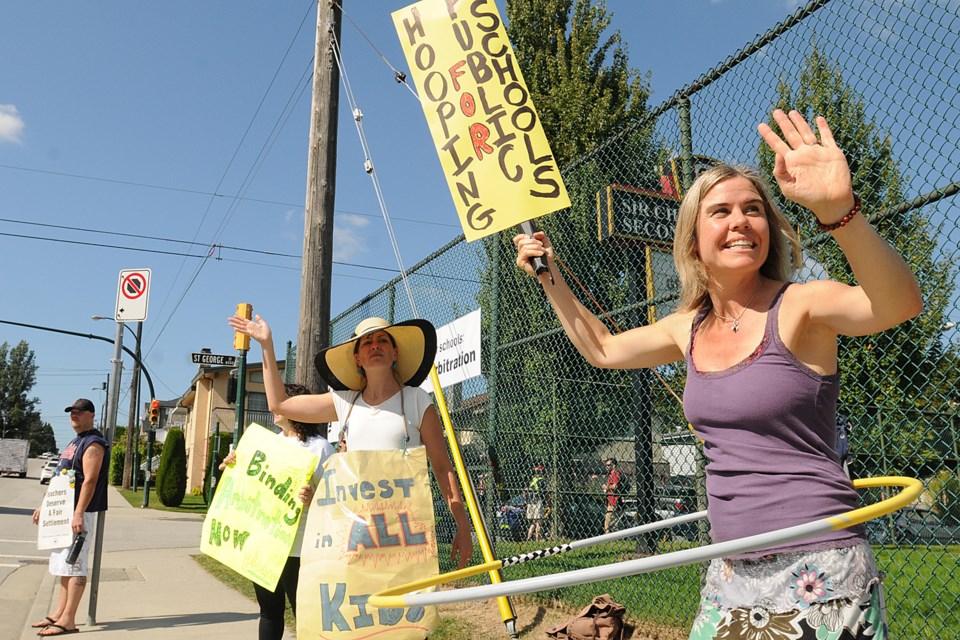The neighbours who live on King Edward Avenue across the busy street from Sir Charles Tupper secondary asked that striking teachers not start picketing school grounds along the east-west thoroughfare at 6 a.m.
Their reason: too much honking.
So now, when the first rotating shift begins at 6 a.m., teachers keep to Tupper’s front doors on residential West 24th Street, which sees less traffic. At 7 a.m., they expand to King Edward.
“The honking is good moral support. The public is keeping us going,” said Bonnie Burnell, a social studies teacher who began her career in the ’80s.
When a parent arrived on the picket line to voice her frustration over the closed school and her son’s delayed Grade 12 year, Burnell talked with her at length and persuaded her to attend a demonstration scheduled for 10 to 12 a.m. Sunday at the Vancouver Art Gallery.
Burnell emphasized the public’s role in the province-wide labour dispute that interrupted classes in June and has delayed the start of the school year.
“They and only they can end this strike,” said Burnell. “They have to get out on the streets and demonstrate. The government needs to see that.”
She wore a pink, hand-drawn sign that read “Ask for arbitration” and said, as union president Jim Iker has maintained, the sticking point in negotiations is a clause known as E80, which they say would supersede any court decision to allow the teachers’ union to negotiate class size and composition in this round of bargaining and potentially in the future. If the contentious clause is included, it would imply the current contract would negate a January decision from the Supreme Court of B.C. that ruled in favour of the union. The government is appealing the decision.
Teachers walking the line outside Tupper along with Burnell were adamant they would not back down.
Guy Demers said his frustration stemmed from the Liberal government’s seeming refusal to accept two court rulings on teachers’ collective bargaining rights.
“The government — this is brutal — is either not very bright or they’re lying,” said Guy Demers, who has taught English for eight years at Tupper. “It’s not about the money. It’s not about the signing bonus. I don’t know how I can go back to my students having basically given up our constitutional right to bargain.”
In her January, 2014 ruling, B.C. Supreme Court judge Susan Griffin held up a 2011 decision that favoured the union’s rights and she added that the government did not previously negotiate with teachers in good faith, largely because their representatives “were pre-occupied by another strategy,” in her opinion.
The judge wrote: “Their strategy was to put such pressure on the union that it would provoke a strike by the union. The government representatives thought this would give government the opportunity to gain political support for imposing legislation on the union.”
Outside Tupper, teachers said they have remortgaging their homes, are living on credit or are relying on spouses, family and other unions across the province and country to help pay bills.
“I feel like they’re trying to starve us out,” said Jackie Dowling, who is one year into a three-year Master’s degree and now turning to student loans. Her last paycheque was in June and since then she has received three $50 cheques for strike pay. “And one of those came thanks to the teachers in Ontario,” she said, adding her husband is a manager at Costco but her savings will be depleted with this month’s bills.
“It’s very stressful. I have sleepless nights,” said Dowling. “And I am way luckier than most.”
mstewart@vancourier.com
twitter.com/MHStewart



